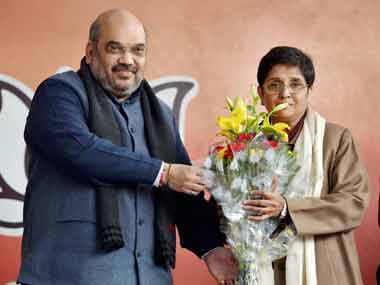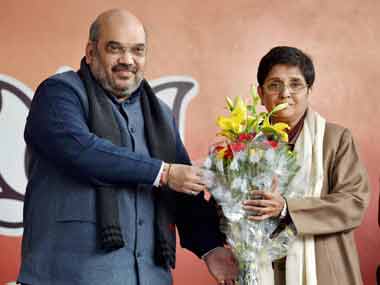Naming Kiran Bedi, who has spent just 5 days as a member of the BJP and in the active politics, as the party’s chief ministerial candidate for Delhi is a big bold move by Narendra Modi and Amit Shah. More so, when only two days are to go before nomination of candidates close and only 16 days are left when the campaigning would come to a halt. In his press conference, the BJP chief, who eloquently dwelt on Bedi’s academic, administrative and social credentials, sent out a clear massage to all concerned within party, Parivar and outside that they should treat Bedi with due respect. The confirmation of Bedi’s choice clearly indicates two factors counted most to Modi – winnability of an election and selecting a person who can be entrusted with his developmental agenda. He has also answered sceptics within and outside of the BJP who speculated as to whether Bedi’s induction had RSS’s nod, and whether the RSS would accept somebody from outside of its organisational structure and ideological moorings. He has also rebuffed in-house dissenting opinions emanating from the likes Manoj Tiwari and Jagdish Mukhi. A section of Delhi BJP leaders surely wouldn’t be comfortable with the newly chosen leader but the BJP parliamentary board did not think it to be a hindering factor so long as she is able to directly connect with the masses. Earlier on Monday, her inaugural road show in Rohini was considered to be a success, both in terms of mobilisation of ground level workers and of voters. Bedi’s persona is also seen as a match for Arvind Kejriwal’s charisma and she will outmatch the latter’s credentials as a fighter against “corruption and crime”, the two factors that were repeatedly mentioned in Amit Shah’s 11 pm press conference on Monday night. In Maharastra, Haryana and Jharkhand, the Modi-Shah duo discarded conventional political wisdom by choosing chief ministers outside of the numerically or socially dominant caste or community of the state concerned. That’s a gamble whose consequences will be known only five years from now. All three – Devendra Fadnavis, Manohar lal Khattar and Rahgubar Das – had risen from the ranks in the party and had strong RSS rootings, and as the BJP sources point out, their personal integrity was the single most guiding factor in their nomination for the top post. [caption id=“attachment_2052563” align=“alignleft” width=“380”]
 PTI[/caption] In forming his cabinet, however, Modi brought in Suresh Prabhu and Manohar Parikar to fill top slots in the Union Cabinet where his party members in Parliament could not fill the requirement. His Bedi pick can be seen as a similar, if not identical, move. The Delhi experiment is also far more bold a move, fraught with risks. It is always easier to enforce compliance of post poll diktats than hazard the uncertainty of pre-poll complexities. Modi could perhaps undertake this experiment because Delhi in any case is a “half-state” and it needs a good administrator than a good politician with strong ideological moorings. Bedi by all counts is a seasoned administrator and has the capacity to take on high and mighty, as also the entrenched groups. A “Kiran versus Kejriwal” battle has placed BJP on an even keel with the Aam Aadmi Party. Talking to the voters in various parts of Delhi, Firstpost got a sense that apart from the middle class – which in these elections have gone over to the BJP – sections of people who were otherwise considered to be mainstay of AAP are also revising their opinion. Also in the last elections AAP got a great deal of support from women voters. Her credentials as a non-nonsense police officer could potentially help BJP in convincing a number of women voters that the party is serious about handling issue of women safety in Capital. The BJP is still banking on Modi’s charisma to win the Delhi elections, but unlike other states, Delhi voters are conscious of the fact that Modi, the PM can’t be CM. And it is here that Kejriwal is scoring over the BJP. By pitching Bedi in leadership position, the BJP has blunted that edge. Bedi couldn’t be on the dais when she was formally anointed to be the Chief Minister in waiting. It’s a life time moment for any leader. She and her party bosses would be hoping that a bigger moment may await her when voting concludes in three weeks.
PTI[/caption] In forming his cabinet, however, Modi brought in Suresh Prabhu and Manohar Parikar to fill top slots in the Union Cabinet where his party members in Parliament could not fill the requirement. His Bedi pick can be seen as a similar, if not identical, move. The Delhi experiment is also far more bold a move, fraught with risks. It is always easier to enforce compliance of post poll diktats than hazard the uncertainty of pre-poll complexities. Modi could perhaps undertake this experiment because Delhi in any case is a “half-state” and it needs a good administrator than a good politician with strong ideological moorings. Bedi by all counts is a seasoned administrator and has the capacity to take on high and mighty, as also the entrenched groups. A “Kiran versus Kejriwal” battle has placed BJP on an even keel with the Aam Aadmi Party. Talking to the voters in various parts of Delhi, Firstpost got a sense that apart from the middle class – which in these elections have gone over to the BJP – sections of people who were otherwise considered to be mainstay of AAP are also revising their opinion. Also in the last elections AAP got a great deal of support from women voters. Her credentials as a non-nonsense police officer could potentially help BJP in convincing a number of women voters that the party is serious about handling issue of women safety in Capital. The BJP is still banking on Modi’s charisma to win the Delhi elections, but unlike other states, Delhi voters are conscious of the fact that Modi, the PM can’t be CM. And it is here that Kejriwal is scoring over the BJP. By pitching Bedi in leadership position, the BJP has blunted that edge. Bedi couldn’t be on the dais when she was formally anointed to be the Chief Minister in waiting. It’s a life time moment for any leader. She and her party bosses would be hoping that a bigger moment may await her when voting concludes in three weeks.
Kiran Bedi's anointment as Delhi CM candidate is signature Modi politics
Sanjay Singh
• January 20, 2015, 09:14:40 IST
The confirmation of Bedi’s choice clearly indicates two factors counted most to Modi – winnability of an election and selecting a person who can be entrusted with his developmental agenda. He has also answered sceptics within and outside of the BJP who speculated as to whether Bedi’s induction had RSS’s nod, and whether the RSS would accept somebody from outside of its organisational structure and ideological moorings.
Advertisement
)
End of Article